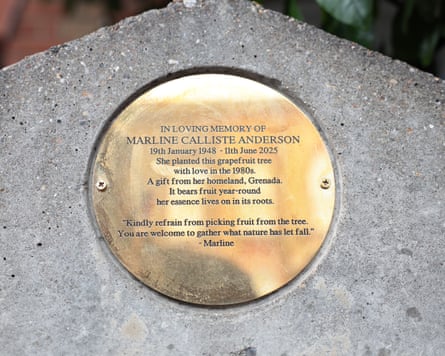The pair of subtropical grapefruit trees have stood, slightly incongruously, on a street in south-west London for 40-odd years since Marline Anderson brought them over from Grenada – a “gift” from her homeland – and planted them in her front garden.
The trees will remain as a memorial to Anderson, who died recently, after campaigners seeking to protect them were told on Thursday they had been successful.
Vasilisa Ermakova, a friend and neighbour of Anderson, said the campaign had been not only about the preservation of the trees but also about preserving the memory of her friend. “It’s almost like she will live for ever in my eyes.”
The trees, often referred to in the singular, but actually two planted close together, Ermakova said, are thought to be among few of their species growing outside Kew Gardens in the UK.
A plaque on the wall outside Anderson’s former house in Battersea tells passersby she planted the grapefruit trees “with love in the 1980s”. It reads: “A gift from her homeland, Grenada. It bears fruit year-round, her essence lives on in its roots.”
The plaque also carries Anderson’s words: “Kindly refrain from picking fruit from the tree. You are welcome to gather what nature has let fall.”
Lior Berman, a local chef who has campaigned for the trees to be given legal protection, said she had turned the fruit into a marmalade for her business, Lior’s Kitchen. “It was like candied orange, but a bit more bitter. You can use the leaves for tea, or to wash your hair.”
Berman said if anyone had come to remove the trees, people would have lost something special. “You want to have a relationship and a connection to nature. When you have a healthy, mature tree that produces fruit in the city, you want to protect it as much as you can,” she said.
“People go way, way too far from nature. These are exactly the little things that can allow us to have that healthy connection with nature. Gardening is healthy, it’s relaxing, it’s good for your mental health.”
That is one of the reasons that the campaigners, including Berman and Ermakova, gave for the trees to be protected. They were concerned that because the flat belongs to Wandsworth council, that they would end up being removed.
Those fears have now been allayed after the deputy leader of the council, Kemi Akinola, arrived at the house on Thursday to reveal the council had agreed to implement a protection order meaning there would be legal ramifications for anyone who removed them. The council has also committed to maintaining the trees.
The order is interim, pending full approval, which can only be granted after a consultation period of 28 days. But Akinola said the political will was there to protect this piece of the area’s heritage.
She said: “We’re trying to record the history of our Windrush generation at the moment. Because, otherwise, once they go, the stories will go.” Small pieces of heritage such as the grapefruit trees in Battersea are part of that story, she said.
“Marline was the community,” said Ermakova. “Everybody in the street knows she was friends with everybody. She looked after everybody. She has three children, but I always say she probably has about 20 children because everybody calls her ‘Mum’.”
Ermakova said she was happy the trees had received the kind of protection their long sharp thorns could not provide. “Happy, but a little bittersweet because, obviously, she’s not here to see it. And she would have really loved to have known it would be protected.”
Ermakova said she is not yet sure how she feels, given the short period of time since Anderson’s death. “I think all of us family and friends are going to be just overwhelmed, given the funeral was only on Monday.”
But she added: “If we can drive down here in 50 years and see the tree, then that will be quite phenomenal.”











